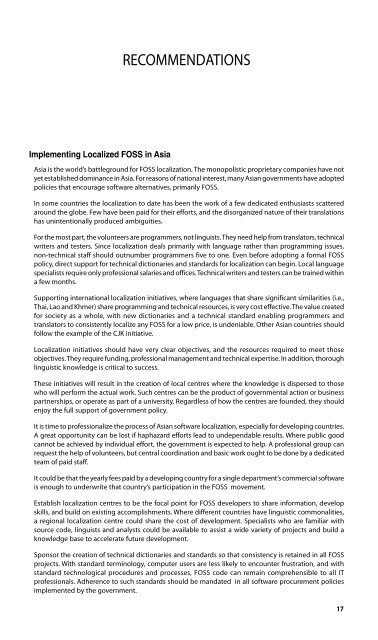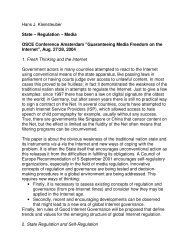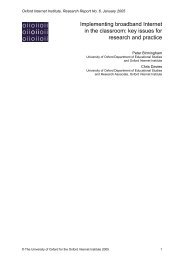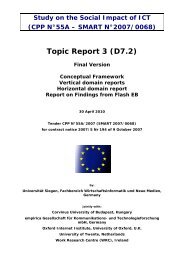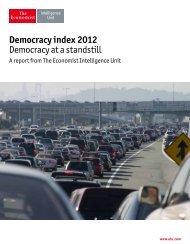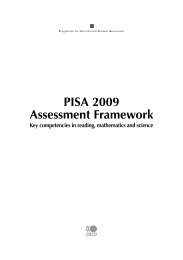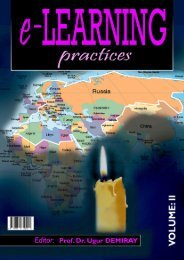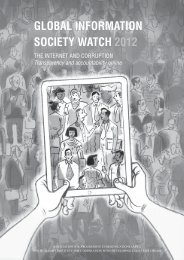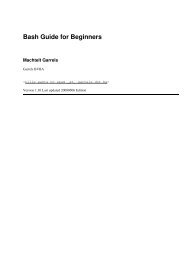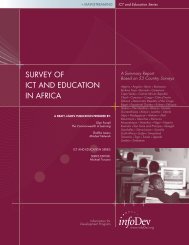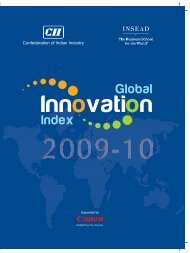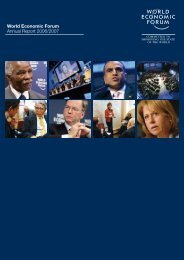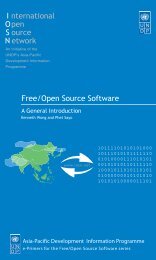RECOMMENDATIONSImplementing Localized FOSS in AsiaAsia is the world’s battleground for FOSS localization. The monopolistic proprietary companies have notyet established dominance in Asia. For reasons of national interest, many Asian governments have adoptedpolicies that encourage software alternatives, primarily FOSS.In some countries the localization to date has been the work of a few dedicated enthusiasts scatteredaround the globe. Few have been paid for their efforts, and the disorganized nature of their translationshas unintentionally produced ambiguities.For the most part, the volunteers are programmers, not linguists. They need help from translators, technicalwriters and testers. Since localization deals primarily with language rather than programming issues,non-technical staff should outnumber programmers five to one. Even before adopting a formal FOSSpolicy, direct support for technical dictionaries and standards for localization can begin. Local languagespecialists require only professional salaries and offices. Technical writers and testers can be trained withina few months.Supporting international localization initiatives, where languages that share significant similarities (i.e.,Thai, Lao and Khmer) share programming and technical resources, is very cost effective. The value createdfor society as a whole, with new dictionaries and a technical standard enabling programmers andtranslators to consistently localize any FOSS for a low price, is undeniable. Other Asian countries shouldfollow the example of the CJK initiative.Localization initiatives should have very clear objectives, and the resources required to meet thoseobjectives. They require funding, professional management and technical expertise. In addition, thoroughlinguistic knowledge is critical to success.These initiatives will result in the creation of local centres where the knowledge is dispersed to thosewho will perform the actual work. Such centres can be the product of governmental action or businesspartnerships, or operate as part of a university. Regardless of how the centres are founded, they shouldenjoy the full support of government policy.It is time to professionalize the process of Asian software localization, especially for developing countries.A great opportunity can be lost if haphazard efforts lead to undependable results. Where public goodcannot be achieved by individual effort, the government is expected to help. A professional group canrequest the help of volunteers, but central coordination and basic work ought to be done by a dedicatedteam of paid staff.It could be that the yearly fees paid by a developing country for a single department’s commercial softwareis enough to underwrite that country’s participation in the FOSS movement.Establish localization centres to be the focal point for FOSS developers to share information, developskills, and build on existing accomplishments. Where different countries have linguistic commonalities,a regional localization centre could share the cost of development. Specialists who are familiar withsource code, linguists and analysts could be available to assist a wide variety of projects and build aknowledge base to accelerate future development.Sponsor the creation of technical dictionaries and standards so that consistency is retained in all FOSSprojects. With standard terminology, computer users are less likely to encounter frustration, and withstandard technological procedures and processes, FOSS code can remain comprehensible to all ITprofessionals. Adherence to such standards should be mandated in all software procurement policiesimplemented by the government.17
18 ❘ FREE/OPEN SOURCE SOFTWARE: LOCALIZATIONMove fast. It is important to have things done correctly, but it is also important to do them quickly.Writing a good computer glossary for a low-technology language can take over a year, but a first glossarythat will suffice for translating the first versions of the programs can be done very quickly (e.g., in threemonths). Future versions of the programs will use the final glossary, but first versions can be availablewithin months. An official “portal” detailing the prescribed terminology and standards should be the firstpriority.Encourage the distribution of FOSS operating systems, applications and platforms. With little cost,governments can distribute localized FOSS to schools, businesses and other organizations. This wouldjumpstart the rate of adoption of computers and software in general, and prevent the unnecessary illegalcopying of proprietary software. Because FOSS often works with older machines, the total price ofproviding computing access to the masses would be lower than that for any other approach.Provide FOSS training not only for computer professionals, but also in primary and secondary schools. Indeveloping countries where educational budgets are stretched thin, the use of localized FOSS operatingon low-cost computers is well suited for increasing educational opportunities in rural communities. Thenatural curiosity of the youth should quickly result in a new generation that knows how to use computersin their native language. Those students who show a special talent for using computers can be encouragedto learn programming through scholarships, contests and other age-appropriate activities.Beyond establishing governmental purchasing policies that favour localized FOSS, governments havean important role in removing obstacles, providing funding and coordinating standards. Withoutgovernmental support, “anglicisms” and inconsistencies will severely hamper the continued localizationof FOSS, and limit the possibilities for growth of an indigenous software industry.Skills and Tools Required for Localization ProjectsLocalization often occurs when the country is already using computers in a foreign language. Computerscientists and trainers are used to an English or French computer vocabulary. Localization thereforerequires creating training materials based on the language used in the glossary, so that trainers and newusers will start using the local language.As it is difficult to engage linguists, preparatory work can be done first, such as looking for differenttranslation options for each term.After this, the work is mainly that of translators, who follow glossary guidelines and rules. There shouldbe professional translators and computer scientists in the same team to assure linguistic and technicalcorrectness of the terms used.Localization can increasingly be performed without too many technical resources, once the first layer ofthe work is done (fonts, language support, etc.). In the future, it will become easier, since almost all FOSSprojects are adopting new tools and techniques to make it easier for non-experts to perform the work.The skilled workers who can perform software localization are often already available, or can be trainedlocally or abroad. Regional software localization training and coordination centres could act as clearinghousesand colleges for individuals to improve their skills, and thereby produce new workers for theyears ahead. Fortunately, only the programmers need to have specialized knowledge of FOSS. The otherprofessionals can have previous experience with any type of software.Office space that is sufficient and appropriate for the work at hand is a must for any project where workis not distributed ad hoc around the world. For a professional localization effort, and especially formultilingual regional localization centres, a commercial space is best. This includes stable low-costbroadband connections to the Internet, LAN and development servers, sufficient client computers foreach employee and three or four terminals for each tester.Active participation and cooperation from universities, especially linguists and translators of English,should be solicited. Publishing rights for scholars who make significant contributions to technicaldictionaries and standards should be granted, as well as public recognition for student volunteers.Typically, the following people need to be trained, organized and provided with the tools to succeed:Project managers – technical and translation.


